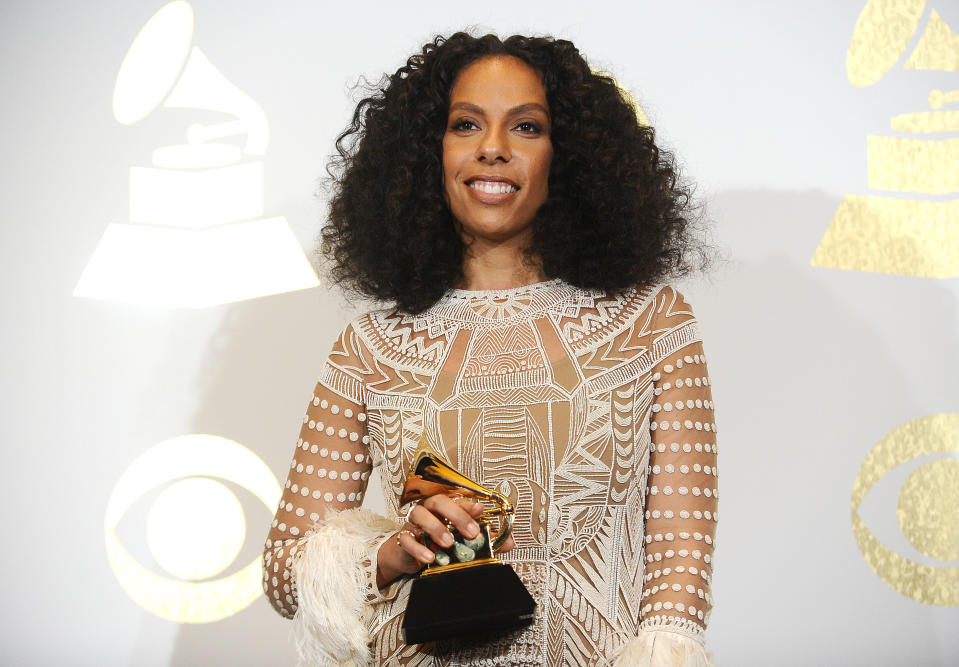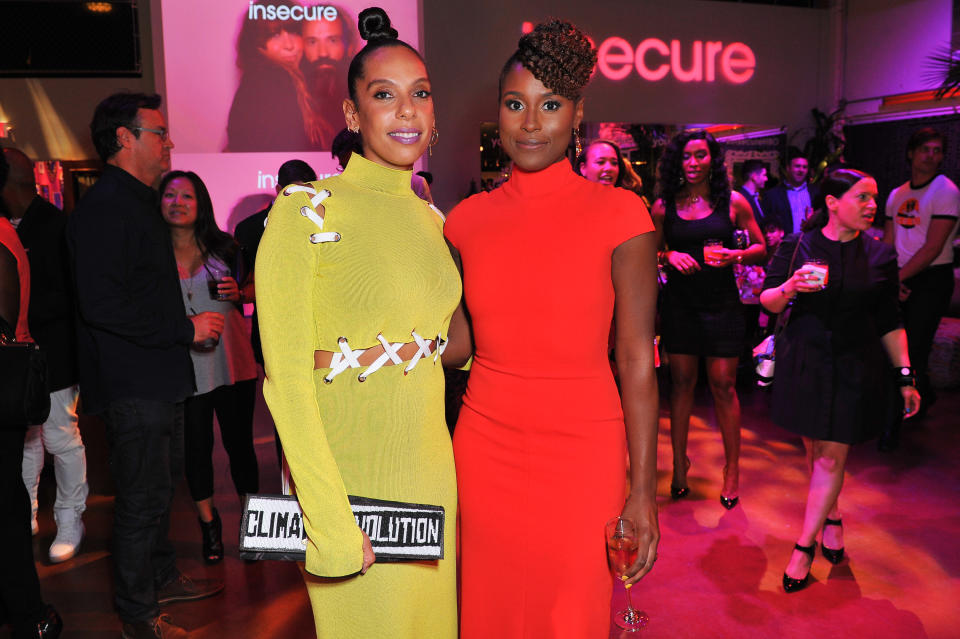11 Life Lessons I Learned From Melina Matsoukas

If you don't already know Melina Matsoukas by name, you definitely know her work. The 36-year-old director is responsible for iconic, groundbreaking music videos like Rihanna's "We Found Love," Beyoncé's "Formation"–both of which earned her Grammys–and directing and executive producing HBO's hit series by Issa Rae, Insecure. Over the weekend she returned to her alma mater, New York University Tisch School of the Arts, to be honored as Woman of the Year at the Fusion Film Festival. There, she hosted a totally packed masterclass with aspiring directors. Many of them were young women of color, a group Matsoukas hopes to uplift and inspire in particular. "It's a responsibility that I have and I inherited that path because there just haven't been that many before me," she told ELLE.com after the event. "We need each other and we lean on each other."
Here, 11 more gems from Matsoukas's class and our conversation.
1. Find your own "Beyoncé" who will push you.
"I like to know that my actors or my performers are going into it with the same amount of passion that I have for the project. They're as dedicated to achieving as I am. If you have a collaborator who is as excited–like Beyoncé, is the hardest working person I know–she is right there with me. Sinking in freezing cold water in order to get the last shot [for Formation]. So we're in there together. And if she's there, then I better show up. If she's willing to do that as her, then, I have that responsibility to do the best that I can."
(above, a playlist of videos directed by Matsoukas)
2. Embrace fear.
"For me, the scariest moment is walking on set before we shoot the first shot and I am so anxious. It's a lot of pressure and it's scary and I don't think that fear ever goes away. You don't know if it's going to be a great shoot or not so I always have that anxiety. You just gotta show up. You gotta puff out your chest and speak up. I'm quite a loud person on set, so that helps. But you know, you gotta buck up and work."

3. Invest in learning more about your identity to get the best possible work.
"For me it started [at NYU], I needed to know who I was, so I took the opportunity while I was studying film to minor in African American studies. I wanted to know my history, who I was, Pan-Africanism. I studied the background in which I came from so, as a woman of color, I could be confident in my own story and then how that translates into film. I believe having the education is really helpful. That's how you get better, you learn who you are. It's about learning from your mistakes, growing, learning those lessons, even though they may be hard. [It's about] understanding who you are so you're always at least confident in your story. [That] really allowed me to have that confidence in knowing who I was as a filmmaker. That process never stops."
4. Never let yourself feel like you've "made it."
"I don't know if you ever feel like' 'I made it.' I definitely don't. I definitely always have room to grow and always want to grow and always want to elevate whatever I am doing. I never feel like anything I have done is perfect. I feel like there is always room for improvement. Which, I think, has always challenged me to get out of my comfort zone and not do what I am used to. It's also satisfying to kind of stay in the same cycle of work. I like to change it up and I like to have a diverse body of work. To me, it's what feeds me as an artist. I have to work on things that are all different and I never kind of want to repeat my same story. I love to do things in comedy. I love to do things that are dramatic or fashion-based, and that's why I try to work in all different forms of filmmaking."
I never feel like anything I have done is perfect. I feel like there is always room for improvement.
5. Don't chase the money.
"The worst career advice is to just do something because it's paying, and there are a lot people out there that will push you to take a job because of money. I am not motivated by money and I have found a lot of disappointment when I've had to do something because I needed to support myself in that way. I didn't feel passionate about it. For me, it's extremely destructive and depressing, and that's fine for others, it's just not my way. Some people work out of [money] and that's their motivation, it's just not mine. But, I do feel like you can do both. You can create art and pieces you believe in, and you can sustain yourself. There is no reason that's not possible."

6. Be goal-oriented.
"For me, it's always about formulating a goal and figuring out how to get there, and honing your skills, and creating as big of a weaponry as you can to achieve that goal and to not get distracted. I have been distracted. I was a creative director for a couple months and I decided I didn't want to do that because I wanted to become a filmmaker. There were a couple of times I got taken off my path and I had to really re-focus and look at what my goals were and make sure whatever I am working on, or whatever I am doing, is working toward those goals."
As many doors that are slammed in your face, as many people that don't look like you are in the room, you're meant to be there.
7. Be versatile but stay true to the path you want
"Creating diversity in your work is important because it shows that you're capable and you're not just a one trick pony, which people will try to force you into. Also, resisting certain opportunities that are tempting. I resisted for a while doing beauty commercials that were about makeup [...] I know, as a woman, it's very easy to see [me] in that light. But I think you should set your goals and figure out what the steps are to get there, and try to stay on the path to do that."
10. Get used to rejection.
"Rejection is a huge part of my career. You will have to get used to rejection because not everybody is going to like what you say and you have to be okay with that. Maybe one lost opportunity means that another larger opportunity will come. I remember when I graduated graduate school and I applied to be this director's assistant, he will remain nameless, but I really wanted to assist him and I didn't get the job. That led to me being able to make my own music videos and work and find my own way and, in a couple of months, I was directing and almost at the same level as he was and I would have probably would have been his assistant still at that time. So, what's for you is for you."
11. Stay humble.
"I would advise my [younger] self to listen. To continue to see and never stop learning and that you're never better than you think you are. You need to stay humble in everything you do. As a woman of color, you have to believe you belong, and you have to know you can make your own way. As many doors that are slammed in your face, as many people that don't look like you are in the room, you're meant to be there. You probably have to be that much stronger in order to get there but you belong there."
You Might Also Like

